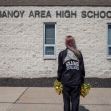The US Supreme Court ruled earlier today in favor of a former cheerleader who was ousted from her high school's cheerleading squad after she shared a social media post in which she used profane language. In this closely watched case, the Pennsylvania cheerleader challenged the school district on the limitations of freedom of speech and argued that the school could not restrict her free speech while off school grounds.
This is not the first case of a student’s free speech being up for debate concerning a school district’s authority, but it is a landmark one because of the added layer social media and personal devices can put on students and their free speech. The implication of off-campus speech and online speech as it pertains to the public school system has the potential to impact 50 million public school students.
The ruling was an 8-1 majority opinion written by Justice Stephen Breyer. In his opinion, Breyer explains, "It might be tempting to dismiss (the student's) words as unworthy of the robust First Amendment protections discussed herein. But sometimes it is necessary to protect the superfluous in order to preserve the necessary."
Breyer also referenced a prior ruling in which the courts made clear that students “do not shed their constitutional rights to freedom of speech or expression even 'at the schoolhouse gate.'” Breyer adds, “But, we have also made clear that courts must apply the First Amendment in light of the special characteristics of the school environment."
This “superfluous” situation stemmed from a 2017 incident in which 14-year-old former cheerleader Brandi Levy posted on social media vulgarities including “F--k school, f--k softball, f--k everything” after she failed to make it on the varsity cheerleading squad at her Pennsylvania high school, Mahanoy Area High.
After school administrators learned of the profanity-laced post, Levy was suspended from the junior varsity cheerleading team, with the school alleging she had violated school rules. Levy pushed back stating that the school had no authority to punish her after she expressed herself while off school grounds.
Following the Supreme Court’s ruling on Wednesday, Levy praised the Court's ruling stating that "The school went too far, and I'm glad that the Supreme Court agrees." Levy added, "Young people need to have the ability to express themselves without worrying about being punished when they get to school. I never could have imagined that one simple snap would turn into a Supreme Court case, but I'm proud that my family and I advocated for the rights of millions of public school students."
Justice Breyer shared this sentiment and explained, "The school itself has an interest in protecting a student's unpopular expression, especially when the expression takes place off campus. America's public schools are the nurseries of democracy."
The only dissenting vote was from Justice Clarence Thomas. Thomas explained that students like Levy "who are active in extracurricular programs have a greater potential, by virtue of their participation, to harm those programs."
Thomas explained, “a profanity-laced screed delivered on social media or at the mall has a much different effect on a football program when done by a regular student than when done by the captain of the football team.”
While the Court sided with Levy and her claims that her freedoms of free speech were violated, the Justices did not take a stance on what Breyer called, "broad, highly general First Amendment rules stating just what counts as 'off-campus speech."
Breyer explained that Levy’s post was not “obscene,” although it did include vulgar words, and that it took place "outside of school hours from a location outside of school.” Coupled with the fact that no individuals from the school were targeted and that her statements were not “abusive” in nature, the school should have had a lower interest in punishing her because of the “features of her speech.”
This case bore themes of similarity with the landmark case brought on by siblings Mary Beth and John Tinker some 50 years ago. The siblings argued that the school violated their First Amendment rights after they faced backlash for wearing armbands to school as a way to demonstrate their protest of the Vietnam War. The Tinker siblings have voiced their support of Levy and her lawsuit.






